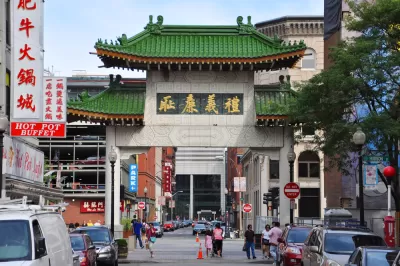The increasingly popular community-oriented mechanism makes neighbors into property owners and preserves affordable housing in perpetuity.

An article by Alexander Thompson and Jocelyn Yang highlights the benefits of community land trusts, which “are pursuing a novel solution to the nation’s affordable housing crisis: They’re buying their own properties to preserve them as affordable housing in perpetuity and give residents more say over what happens in quickly changing neighborhoods.”
“As neighborhoods change and gentrify really fast, the idea of having community control and having more say about how neighborhoods are changing and who’s going to be able to live in the neighborhood over time, from an affordability perspective, I think becomes really important,” says Beth Sorce, who works with community land trusts nationwide at the Grounded Solutions Network, an affordable housing advocacy group.
Imported from Israel’s kibbutzim in the 1970s by Charles Sherrod, the community land trust concept focuses on affordability and community control. Land trusts “reduce the discrimination baked into that system and empower communities to actively fight it,” says Andre Perry, a housing policy expert at the Brookings Institution. “The trust, which is governed democratically by residents and neighbors, can decide to whom the dwelling can be sold and at what price, usually through a covenant in the lease. This ensures the property remains affordable.”
The article highlights Boston’s Chinatown Community Land Trust, which has acquired seven units, and several other trusts around the country. “Really, land trust leaders say, homeownership is just one aspect of their focus on what [Sheldon Clark, who recently served as president of the board of the Douglass Community Land Trust in Washington, D.C.,] calls the “big C” in community land trusts: the community.”
FULL STORY: In Boston, housing that’s affordable – because the community owns the land

Planetizen Federal Action Tracker
A weekly monitor of how Trump’s orders and actions are impacting planners and planning in America.

San Francisco's School District Spent $105M To Build Affordable Housing for Teachers — And That's Just the Beginning
SFUSD joins a growing list of school districts using their land holdings to address housing affordability challenges faced by their own employees.

The Tiny, Adorable $7,000 Car Turning Japan Onto EVs
The single seat Mibot charges from a regular plug as quickly as an iPad, and is about half the price of an average EV.

Seattle's Plan for Adopting Driverless Cars
Equity, safety, accessibility and affordability are front of mind as the city prepares for robotaxis and other autonomous vehicles.

As Trump Phases Out FEMA, Is It Time to Flee the Floodplains?
With less federal funding available for disaster relief efforts, the need to relocate at-risk communities is more urgent than ever.

With Protected Lanes, 460% More People Commute by Bike
For those needing more ammo, more data proving what we already knew is here.
Urban Design for Planners 1: Software Tools
This six-course series explores essential urban design concepts using open source software and equips planners with the tools they need to participate fully in the urban design process.
Planning for Universal Design
Learn the tools for implementing Universal Design in planning regulations.
Smith Gee Studio
City of Charlotte
City of Camden Redevelopment Agency
City of Astoria
Transportation Research & Education Center (TREC) at Portland State University
US High Speed Rail Association
City of Camden Redevelopment Agency
Municipality of Princeton (NJ)




























